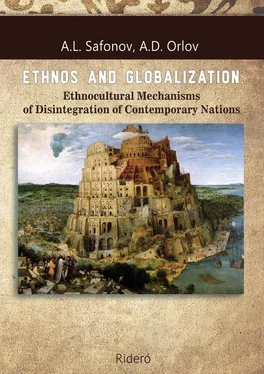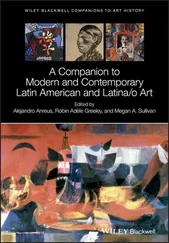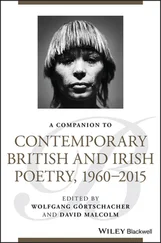The instrumentalists also see this social group as an outcome of a target-oriented activity, not simply as an instrument of power and elites, but as a tool or instrument of the individuals that make up the group that allows use of membership of the group to reach certain goals or to fulfil certain social functions.
Fredrik Barth 44 44 Barth, F. Ethnic Groups and Boundaries: The Social Organization of Culture Difference. M: Novoye izdatel’stvo. 2006. – 286p.
is considered the leader of this movement. Tishkov, 45 45 Tishkov, V. А. Russian people as European nation and its Eurasian mission // Political Class. 2005. 5 Mая.
Guboglo, 46 46 Guboglo, M. N. Identification of Identity: Articles on Ethnosociology. M.: Nauka, 2003. – 288 p.
Voronkov and Osvald, 47 47 Voronkov, В., Osvald, I. Introduction. Post-Soviet Ethnicity // Construction of Ethnic Community of St. Petersburg. St. Petersburg: Dmitry Bulanin, 1998. – p. 7.
Shnirelman, 48 48 Shnirelman, V. A. Misfortunes of one discipline: ethnogenetic research and Stalin’s national policy // Ethnographic Review. 1993. №3 – p. 52—68.
Kulagin, 49 49 Kulagin, A. A. Ethnic and religious identification of the Druze community // Historical Journal – Scientific Research. 2012. №1 – p. 141—159.
Drobizheva, 50 50 Drobizheva, L. M. Methodological problems of ethnosociological research// Sociological Journal. 2006. №3—4.
and Lurye, 51 51 Lurye, S. V. Historical Ethnology: Coursebook for Universities. 2nd edition – M.: Aspekt Press, 1998. – 448 p.
as well as recent works by Popov, 52 52 Popov, Y. A. Ethnic identification in the society through language // Politics and Society. 2012. №3 – p. 104—107.
Nizamova, 53 53 Nizamova, L. R. Complex concept of contemporary ethnicity: limits and possibilities of theoretical synthesis// Journal of Sociology and Social Anthropology. 2009. №1 – p. 141—159.
Nimayeva, 54 54 Nimayeva, B. B. Young people of Agin-Buryat Autonomous Okrug: repertoire of identitites in contemporary sociocultural context // Politics and Legislation. 2011. №9 – p. 75—81.
Ortobayev 55 55 Ortobayev, V. V. Epistemological analysis of ethnosociology // Sociology in the System of Scientific Management: Materials of IV Russian Sociological Congress. M.: Sociological Institute of Russian Academy of Sciences, 2012. – p. 83—92.
and others, should be mentioned among Russian scientists subscribing to the constructivist doctrine. Informational and symbolist (identificational) approaches to ethno- and sociogenesis are in line with constructivism and instrumentalism. 56 56 Arutyunov, S. A. Ethnogenesis, its forms and patterns // Etnopolitichesky vestnik. 1993. №1 – p. 10—19.
, 57 57 Susokolov, A. A. Structural factors of self-organization of ethnos // Races and Peoples. 1990. №20 – p. 5—39.
, 58 58 Hutchinson, J., Smith, A. D. (eds.) Ethnicity. Oxford Readers. Oxford: Oxford University Press, 1996. – p. 29—34.
, 59 59 Hale, H. E. Bashkortostan: the logic of ethnic machine politics and the consolidation of democracy // Timothy J. C., Hough J. F. (eds.) Growing Pains: Russian Democracy and the Election of 1993. Washington, DC: The Brookings Institution, 1998. – p. 47—55.
Sociological research interested in the revitalization of ethnic and ethno-social processes in the south of Russia, includes works by Avksentyev, 60 60 Avksentyev, V. A. Northern Caucauses: Repolitization of Ethnicity and Conflictological Scenarios of Development // Observer. 2006. №6 – p. 19—20.
, 61 61 Matishov, G. G., Avksentyev, V. A., Batiyev, L. V. Atlas of Sociopolitical Problems, Threats and Risks in the South of Russia, V. III. Rostov-on-Don: SKNTS VSH Publishing House, 2008. – 176 p.
Abdulatipov, 62 62 Abdulatipov, R. G. Russian Nation: Ethnonational and Civil Identity of the Russians in the Contemporary Context. M.: Novaya Kniga, 2005. – 472 p.
Gasanov, 63 63 Gasanov, M. R. Paleo-Caucasus Ethnic Community and the Issue of Dagestan Peoples’ Origins. Mahachkala: Dagestan State Pedagogical University Publishing House, 1994. – 194 p.
Gadzhiyev, 64 64 Gadzhiyev, K. S. Ethnonational and Geopolitical Identity of the Caucasus. Saabrucken: Lambert Academic Publishing. 2011. – 531 p.
Markedonov, 65 65 Markedonov, S. M. Ethnonational and Religious Factors in Sociopolitical Life of the Caucasus Region. M.: Maks Press, 2005. – 379 p.
Tishkov, 66 66 Tishkov, V. А. On phenomen of ethnicity // Ethnographic Review. 1997. №3 – p. 3—21.
Tkhagapsoyev, 67 67 Tkhagapsoyev, Х. Political scientists’ keen interest in the Caucasusу // Kabardino-Balkarskaya Pravda. 2010. Feb. 6.
Chernous, 68 68 Chernous, V. V. Increase in importance of ethnocentrism on the cusp of the first decade of the XXI century as consequence of imitational modernization of Northern Caucasus // Collection of Materials and Reports of III International Scientific and Applicability Conference “Caucasus – Our Home” (September 29—October 2, 2011, Rostov-on-Don) / Edited by Y. G. Volkov. Rostov-on-Don: Sotsialno-Gumanitarnye Znaniya, 2011. – p. 25—30.
Denisova, 69 69 Denisova, G. S. Southern Russian identity in the context of administrative reorganization of the macro-region // Sociology in the System of Scientific Management: Materials of IV Russian Sociological Congress. M.: Sociological Institute of Russian Academy of Sciences, 2012. – p. 48—52.
Zhade, 70 70 Zhade, Z. A. Structure of multilevel identity of the population of the Republic of Adygea // Sociology in the System of Scientific Management: Materials of IV Russian Sociological Congress. M.: Sociological Institute of Russian Academy of Sciences, 2012. – p. 74—83.
Sampiyev, 71 71 Sampiyev, I. M. СаMоопределение народов: теория и онтология. Rostov-on-Don: SKNTS VSH Publishing House, 2004. – 152 p.
Hoperskaya, 72 72 Khoperskaya, L. L., Kharchenko, V. A. Local Interethnic Conflicts in the South of Russia: 2000—2005. Rostov-on-Don: YNTS RAN Publishing House, 2005. – 164 p.
Hunagov, 73 73 Khunagov, R. D. Russian identity in contemporary Northern Caucasus’ society// Sociology in the System of Scientific Management: Materials of IV Russian Sociological Congress. M.: Sociological Institute of Russian Academy of Sciences, 2012. – p. 62—68.
Tsutsiyev, 74 74 Tsutsiyev, А. А. Atlas of Ethnopolitical History of Caucasus (1774—2004). M.: Evropa, 2006. – 128 p.
Shadzhe, 75 75 Shadzhe, A. Y. Coexistence of identities in Northern Caucasus // Sociology in the System of Scientific Management: Materials of Russian Sociological Congress. M.: Sociological Institute of Russian Academy of Sciences, 2012. – p. 120—127.
Shakhbanova 76 76 Shakhbanova, M. M. Ethnic identity of Ando-Tsezic group (based on results of sociological research) // Scientific Problems of Humanitarian Research. 2011. №6 – p. 54—62.
and others.
Chapter I. The crisis of nations and increase of importance of the ethnos during globalization
The main goal of social philosophy has always been to understand the leading tendencies of historical evolution that determine the fate of the society and the individual, to search for the few key patterns that allow us to see or even create the outlines of the future through the chaos of reality.
Читать дальше












